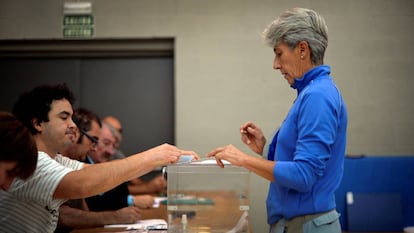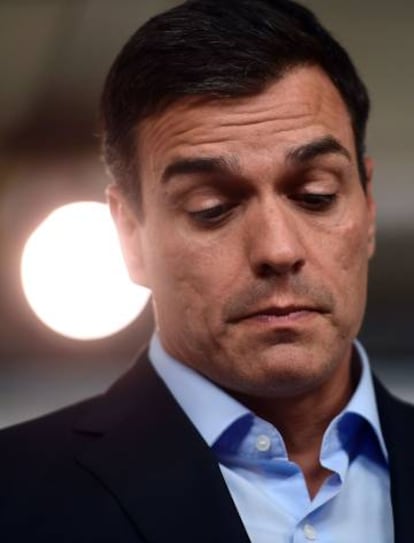Time running out as Spain fights to avoid third election in a year
Socialist Party’s leadership crisis delays cross-party talks on forming government

Regional elections held in Galicia and the Basque Country on Sunday have done nothing to clear up the political scenario in Spain, where in all probability voters will soon be asked to go to the polls again for a record third time.
Following the Socialist Party (PSOE)’s dismal results in both regions, party leader Pedro Sánchez has decided to put his leadership to the vote at a party conference on October 23.
The Socialist Party is split between those who feel it should let Rajoy form a government and those who refuse to do so
Until the leadership question is put to bed, the PSOE will not be engaging in further cross-party talks to reach a deal that might pull Spain out of the political deadlock that has plagued the country since December of last year.
But because of the way Spanish voting legislation works, the current Congress has been in a countdown ever since it held an investiture session in early September to choose a new prime minister.
The acting prime minister, Mariano Rajoy, lost his re-election bid after being voted down by all other forces in the chamber, and this in turn created a two-month deadline to either find a new PM or have the king dissolve parliament and call new elections.
This means that politicians will only have one week – from October 23 to October 31 – to conduct cross-party negotiations that might save Spaniards from going to the polls again on December 25, a full year after the original general election of December 20, 2015.

And so far, there is little to indicate that a deal will be reached. On Monday, Sánchez said he will not step down even if the federal committee rejects his proposal for a party conference and primaries. He also added that he would rather see third elections than help Rajoy into government.
“I don’t want third elections just like I didn’t want second ones, but for a democrat, elections are never a bad solution,” he said. “A bad solution is for the left to use its vote to try to pardon Rajoy. He cannot be the prime minister for even 15 minutes more.”
Possible combinations
The Popular Party (PP), which won the most votes at both general elections but fell short of a congressional majority both times, has failed to attract enough support to get Rajoy reinstated, yet is not willing to make any significant concessions to facilitate an agreement.
The PSOE is split between those who feel it should let Rajoy form a government and those who reject that possibility outright – such as party leader Sánchez.
Sánchez would like to create an alternative government with Ciudadanos and Podemos, but these two groups refuse to work together. Another option would involve the Socialists with Podemos and several Basque and Catalan parties, but many Socialist officials oppose Catalan nationalists’ demands for an independence referendum.
There is an outside chance that the PP could bypass the PSOE altogether by securing support from the center reform party Ciudadanos and the Basque Nationalist Party (PNV) – but Ciudadanos refuses to work with any regional party that harbors separatist sentiments. And the PNV seems equally disinclined to help, particularly as it does not need the PP’s help to form a new government in the Basque Country.
Ultimately, the PP and Ciudadanos could secure enough of a majority to get Rajoy reinstated as long as the Socialists either vote favorably or abstain at a new investiture vote. If Sánchez gets his primaries and is re-elected on October 23, this will not be happening. If a new leader emerges, it remains to be seen what strategy he or she will follow – if there is still time.
English version by Susana Urra.
Tu suscripción se está usando en otro dispositivo
¿Quieres añadir otro usuario a tu suscripción?
Si continúas leyendo en este dispositivo, no se podrá leer en el otro.
FlechaTu suscripción se está usando en otro dispositivo y solo puedes acceder a EL PAÍS desde un dispositivo a la vez.
Si quieres compartir tu cuenta, cambia tu suscripción a la modalidad Premium, así podrás añadir otro usuario. Cada uno accederá con su propia cuenta de email, lo que os permitirá personalizar vuestra experiencia en EL PAÍS.
¿Tienes una suscripción de empresa? Accede aquí para contratar más cuentas.
En el caso de no saber quién está usando tu cuenta, te recomendamos cambiar tu contraseña aquí.
Si decides continuar compartiendo tu cuenta, este mensaje se mostrará en tu dispositivo y en el de la otra persona que está usando tu cuenta de forma indefinida, afectando a tu experiencia de lectura. Puedes consultar aquí los términos y condiciones de la suscripción digital.








































